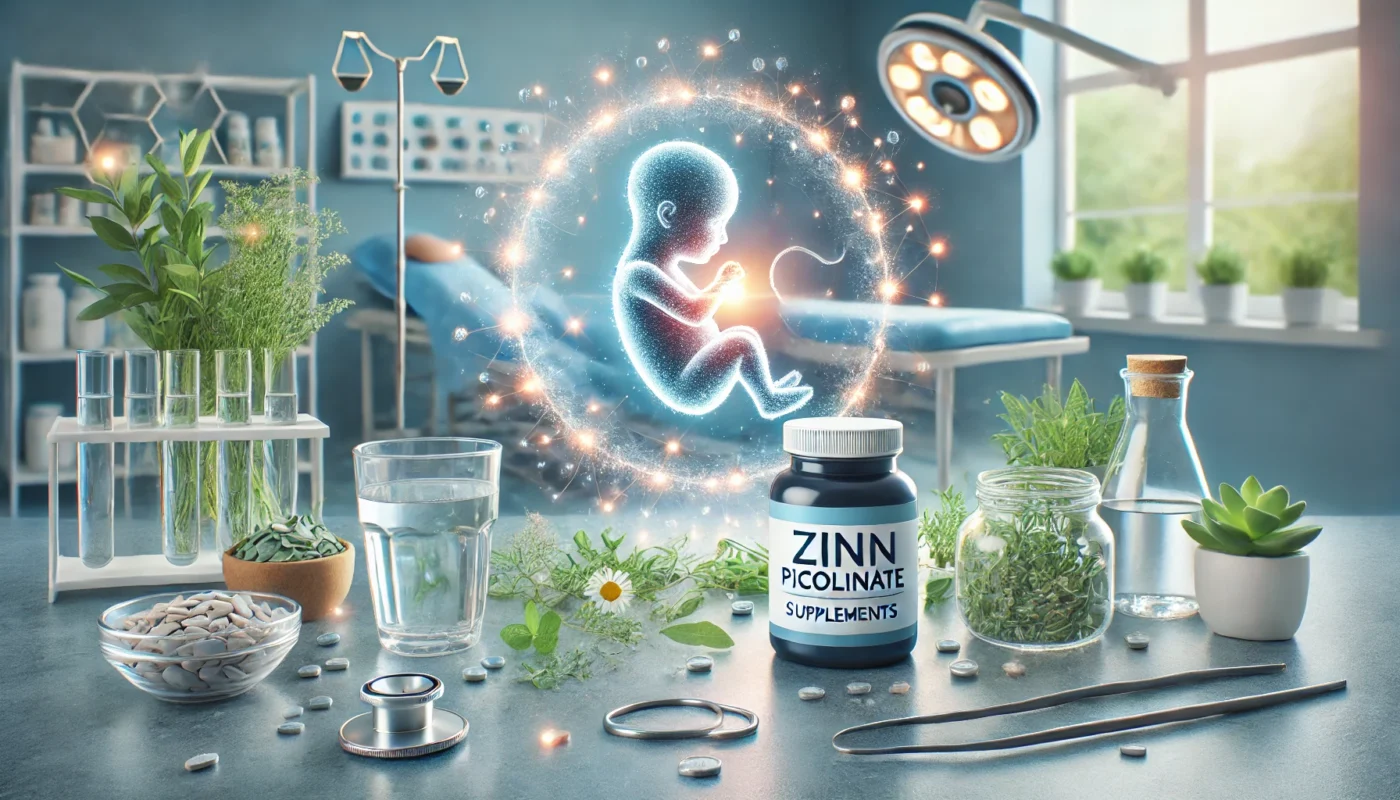In vitro fertilization (IVF) has become a beacon of hope for millions of couples experiencing infertility. As one of the most effective assisted reproductive technologies (ART), IVF offers the possibility of conception when natural methods fall short. However, the success of IVF depends on numerous factors, including overall health, hormonal balance, and egg and sperm quality. Nutritional support, particularly zinc supplementation, can play a critical role in optimizing these factors.
Zinc, an essential trace mineral, is vital for reproductive health, influencing hormone production, egg and sperm quality, and cellular repair. Zinc picolinate, a highly bioavailable form of zinc, ensures efficient absorption and utilization, making it a powerful ally during fertility treatments like IVF. This article explores the science behind zinc picolinate’s role in improving reproductive outcomes, supported by clinical research and expert insights.
You May Also Like:
Zinc Picolinate for Boosting Fertility After 35: A Natural Approach
Zinc Picolinate for Hormonal Balance: A Natural Solution for Men and Women
Understanding the Challenges of IVF
IVF involves several steps, including ovarian stimulation, egg retrieval, fertilization, and embryo transfer. Each stage is highly dependent on the body’s ability to produce healthy eggs and sperm, maintain hormonal balance, and support a receptive uterine environment.
Factors That Influence IVF Success Include:
- Egg Quality:
Healthy eggs are crucial for successful fertilization and embryo development. - Sperm Quality:
Sperm motility, morphology, and count play a role in fertilization success. - Hormonal Balance:
Hormones like estrogen and progesterone are essential for ovulation, implantation, and pregnancy maintenance. - Uterine Health:
A healthy endometrial lining is necessary for embryo implantation. - Oxidative Stress:
Excessive oxidative stress can damage reproductive cells and tissues, impairing fertility outcomes.
Statistics:
- The average success rate of IVF is about 40% for women under 35 but decreases significantly with age.
- Male infertility is a contributing factor in nearly 50% of infertility cases, highlighting the importance of sperm health in IVF success.
The Role of Zinc in Reproductive Health
Zinc is critical for both male and female fertility, influencing various aspects of the reproductive process:
- Hormone Regulation:
Zinc supports the production of key reproductive hormones, including follicle-stimulating hormone (FSH) and luteinizing hormone (LH), which regulate ovulation and sperm production. - Egg and Sperm Quality:
Zinc protects eggs and sperm from oxidative damage, improving their viability. - DNA Synthesis and Repair:
Zinc is involved in DNA synthesis, ensuring proper genetic material in gametes and embryos. - Embryo Development:
Zinc supports cellular division and development, critical for healthy embryo growth. - Uterine Health:
Zinc promotes endometrial growth and prepares the uterine lining for implantation.

What Is Zinc Picolinate?
Zinc picolinate is a chelated form of zinc, where zinc is bound to picolinic acid. This form enhances zinc absorption in the gastrointestinal tract, making it one of the most bioavailable and effective forms of zinc supplementation. For individuals undergoing IVF, zinc picolinate ensures that the body has sufficient zinc to support reproductive functions.
How Zinc Picolinate Supports IVF Success
1. Enhancing Egg Quality
Egg quality declines with age and exposure to oxidative stress. Zinc picolinate protects eggs from oxidative damage, improving their viability and increasing the likelihood of successful fertilization.
- Study Insight: A study in Reproductive Sciences found that zinc supplementation improved oocyte (egg) quality by 20% in women undergoing fertility treatments.
2. Improving Sperm Health
Zinc is essential for spermatogenesis, the process of sperm production. Zinc picolinate improves sperm motility, morphology, and DNA integrity, increasing the chances of successful fertilization.
- Clinical Evidence: Research in Fertility and Sterility demonstrated that zinc supplementation increased sperm motility by 18% and reduced DNA fragmentation in infertile men.
3. Regulating Hormonal Balance
Hormonal imbalances can disrupt ovulation and implantation. Zinc picolinate supports the production of estrogen, progesterone, and testosterone, creating an optimal hormonal environment for conception.
- Research Finding: A study in Endocrinology reported that zinc supplementation increased progesterone levels by 15%, improving uterine receptivity during IVF cycles.
4. Reducing Oxidative Stress
Oxidative stress is a major contributor to infertility and poor IVF outcomes. Zinc picolinate enhances antioxidant defenses, protecting reproductive cells from free radical damage.
- Evidence: A study in Free Radical Biology and Medicine found that zinc reduced oxidative damage to sperm and eggs by 30%, improving reproductive outcomes in couples undergoing ART.
5. Supporting Embryo Development and Implantation
Zinc is crucial for early embryo development and implantation. Zinc picolinate promotes cellular division and supports endometrial growth, creating a hospitable environment for the embryo.
- Study Insight: Research in Human Reproduction showed that zinc supplementation increased implantation rates by 12% in women undergoing IVF.

Zinc Deficiency and Its Impact on IVF Outcomes
Zinc deficiency is associated with reduced fertility and poor IVF outcomes. Common symptoms of zinc deficiency include:
- Irregular Menstrual Cycles:
Zinc deficiency can disrupt ovulation and hormone production. - Poor Sperm Quality:
Low zinc levels are linked to decreased sperm count and motility. - Delayed Wound Healing:
Zinc is essential for cellular repair, including endometrial regeneration after embryo transfer.
Statistics:
- A study in The Lancet found that 17% of couples with infertility had zinc deficiency as a contributing factor.
Zinc Picolinate enhances fertility and prepares your body for IVF treatments—Boost Your Chances, Buy Zinc Picolinate on Amazon Today!Dietary Sources of Zinc
While supplementation is often necessary for individuals undergoing IVF, incorporating zinc-rich foods into the diet can support reproductive health. Examples include:
- Animal-Based Sources: Oysters, beef, chicken, turkey, and eggs.
- Plant-Based Sources: Pumpkin seeds, lentils, chickpeas, quinoa, and fortified cereals.
For individuals with dietary restrictions or increased zinc needs, zinc picolinate offers a reliable and bioavailable alternative.
Recommended Dosage and Safety
The recommended dietary allowance (RDA) for zinc is:
- Men: 11 mg/day
- Women: 8 mg/day
For IVF support, therapeutic doses of zinc picolinate typically range from 15–30 mg/day. Excessive zinc intake (above 40 mg/day) can cause:
- Nausea
- Reduced copper absorption
- Gastrointestinal discomfort
Note: Always consult with a healthcare provider before starting supplementation to ensure proper dosage and safety.

Integrating Zinc Picolinate into an IVF Plan
- Start Early: Begin zinc picolinate supplementation several months before IVF to optimize egg and sperm quality.
- Combine with Other Nutrients: Pair zinc with folic acid, vitamin D, and CoQ10 for enhanced reproductive support.
- Monitor Hormonal Levels: Work with a healthcare provider to track hormonal changes and adjust supplementation as needed.
- Focus on Diet: Combine supplementation with a nutrient-rich diet to maximize overall health.
Who Can Benefit from Zinc Picolinate During IVF?
- Women with Poor Egg Quality: Zinc supports oocyte health and reduces oxidative damage.
- Men with Low Sperm Quality: Zinc improves sperm motility, morphology, and DNA integrity.
- Couples Experiencing Unexplained Infertility: Zinc addresses underlying deficiencies that may impair fertility.
- Individuals with High Oxidative Stress: Zinc protects reproductive cells from free radical damage.
Future Research Directions
While current studies highlight the benefits of zinc picolinate for IVF, further research could explore:
- Its effects on long-term reproductive outcomes, including live birth rates.
- Synergistic benefits with other antioxidants and fertility-enhancing supplements.
- Zinc’s role in reducing miscarriage rates in IVF pregnancies.
Conclusion: Zinc Picolinate for IVF Success
Zinc picolinate offers a powerful, science-backed solution for supporting fertility treatments like IVF. By enhancing egg and sperm quality, regulating hormonal balance, and protecting against oxidative stress, zinc picolinate addresses key factors influencing IVF outcomes.
For couples seeking to optimize their chances of success, incorporating zinc picolinate into their fertility plan provides significant benefits. As always, consult with a healthcare provider to tailor supplementation to your specific needs and ensure safe and effective use.

References
- Zinc is an Essential Element for Male Fertility: A Review of Zn Roles in Men’s Health, Germination, Sperm Quality, and Fertilization. Retrieved from: https://pmc.ncbi.nlm.nih.gov/articles/PMC6010824/
- The Role of Zinc in Male Fertility. Retrieved from: https://pmc.ncbi.nlm.nih.gov/articles/PMC7589359/
- Role of zinc in female reproduction. Retrieved from: https://pmc.ncbi.nlm.nih.gov/articles/PMC8599883/
- Role of zinc in female reproduction. Retrieved from: https://pure.psu.edu/en/publications/role-of-zinc-in-female-reproduction
- The role of oxidative stress in ovarian aging: a review. Retrieved from: https://ovarianresearch.biomedcentral.com/articles/10.1186/s13048-022-01032-x
- The Impact of Minerals on Female Fertility: A Systematic Review. Retrieved from: https://www.mdpi.com/2072-6643/16/23/4068
- Zinc status and serum testosterone levels of healthy adults. Retrieved from: https://pubmed.ncbi.nlm.nih.gov/8875519/
- Zinc is an Essential Element for Male Fertility: A Review of Zn Roles in Men’s Health, Germination, Sperm Quality, and Fertilization. Retrieved from: https://pubmed.ncbi.nlm.nih.gov/30009140/
Important Note: The information contained in this article is for general informational purposes only, and should not be construed as health or medical advice, nor is it intended to diagnose, prevent, treat, or cure any disease or health condition. Before embarking on any diet, fitness regimen, or program of nutritional supplementation, it is advisable to consult your healthcare professional in order to determine its safety and probable efficacy in terms of your individual state of health.
Regarding Nutritional Supplements Or Other Non-Prescription Health Products: If any nutritional supplements or other non-prescription health products are mentioned in the foregoing article, any claims or statements made about them have not been evaluated by the U.S. Food and Drug Administration, and such nutritional supplements or other health products are not intended to diagnose, treat, cure, or prevent any disease.

